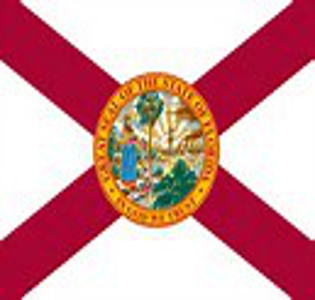
While many pay attention to the ongoing battle regarding online poker – both at the state and federal levels – there are sometimes those governmental moves that influence casino gaming and poker more significantly. In Florida, state legislators are looking to freeze gaming growth in the state, with the House of Representatives passing the first bill to do just that last week, but there is plenty of dissention on the Senate side of Tallahassee towards expansion.
Per the Tampa Bay Times journalist Mary Ellen Klas, legislators in the Sunshine State are looking to freeze gambling expansion in the state for the next two decades. The House bill, HB 7037, would not allow for any of the locations around the state – most have looked towards Miami for casino expansion, but Orlando’s pristine jurisdiction (courtesy of the Disney Corporation) has also been discussed – but would have a far-reaching effect on other gaming outlets in the state. The bill’s top goal would be to allow for Governor Rick Scott to negotiate a new agreement on behalf of the state with the powerful Seminole Indian tribe that operates two Hard Rock Casinos in Tampa and Hollywood and four others spread across Florida.
It is in looking a bit deeper into the bill where some problems might arise from poker players. Recently some of the poker rooms in the state (allowed to exist at the myriad of dog and horse racing tracks operating 24/7) have begun to spread player-banked card games, previously only the domain of the Seminole casinos. The House bill would also cut dormant pari-mutuel permits (what allows for simulcast betting on horse and harness racing) and clean up language in the current laws that could be construed as allowing for future gaming expansion.
The House bill would kick up the yearly contribution by the Seminoles for their “exclusivity” on casino operations. Instead of the current $250 million a year that the Seminoles contribute to the state from their casino operations, they would pay $325 million per year. HB 7037 would also give the Seminoles the exclusive rights to the operation of blackjack in Miami-Dade and Broward counties and could also lead to full-fledged slot machines being installed in their casinos.
HB 7037 is already moving through the Florida legislature. Although Representative Michael LaRosa has stated that “the bill provides much needed certainty and predictability for years to come,” the members of the committee he chairs, the House Tourism and Gaming Control Subcommittee, don’t entirely agree with him. HB 7037 passed out of the subcommittee by a slim margin, 11-7, along a strict party line vote with Democrats opposing the action.
The Senate has their own bill, but it is a world away from what the House is envisioning. The Senate bill, SB 8, would open Miami-Dade and Broward counties for casino gaming, granting the locations one new casino each but not giving the rights to the Seminoles. The Seminoles would get an additional casino outlet to go with their previous six and horse and dog tracks would earn the right to operate slot parlors beyond their poker rooms. SB 8 isn’t set in stone, however, as Klas reports that Senator Bill Galvano has stated the Senate has met with Seminole leaders and there are “changes” that could still be made to SB 8 before it heads to committee.
While the Florida government is talking about how to shape gambling for the near future, what does the Seminole Indian tribes at the center of the discussion think? According to Klas, the tribe has already sent messages that neither the House nor the Senate bills are acceptable at this point. Marcellus Osceola, the chairman of the Seminole Indian Tribal Council, sent a letter to the leaders of the Florida government (Scott, Senate President Joe Negron, and House Speaker Richard Corcoran) loudly disagreeing with their actions.
Osceola points out to the Florida leaders that both bills as they are currently written would look for the tribe to pay more out each year to the state, but they would also lose a great deal of the current monopoly the tribe holds, making the increased payments ludicrous. “Unfortunately, both the Senate and House bills would require dramatic increases in the Tribe’s payments without providing increases in the Tribe’s exclusivity sufficient to justify those higher payments,” Osceola’s letter plainly stated.
The state of Florida has been negotiating with the Seminoles for changes to the current casino industry for the past few years. To this point, Scott nor the Seminoles have been able to reach a consensus on just how far to take any expansion of gaming (if there is to be one), how much influence (if any) the Seminole Indians would have over that expansion and, perhaps most important to the state, the continued influx of millions of dollars into the state’s coffers from the Seminole gaming operations. It appears that the Florida legislature cannot come to an agreement either on which way to move forward.























